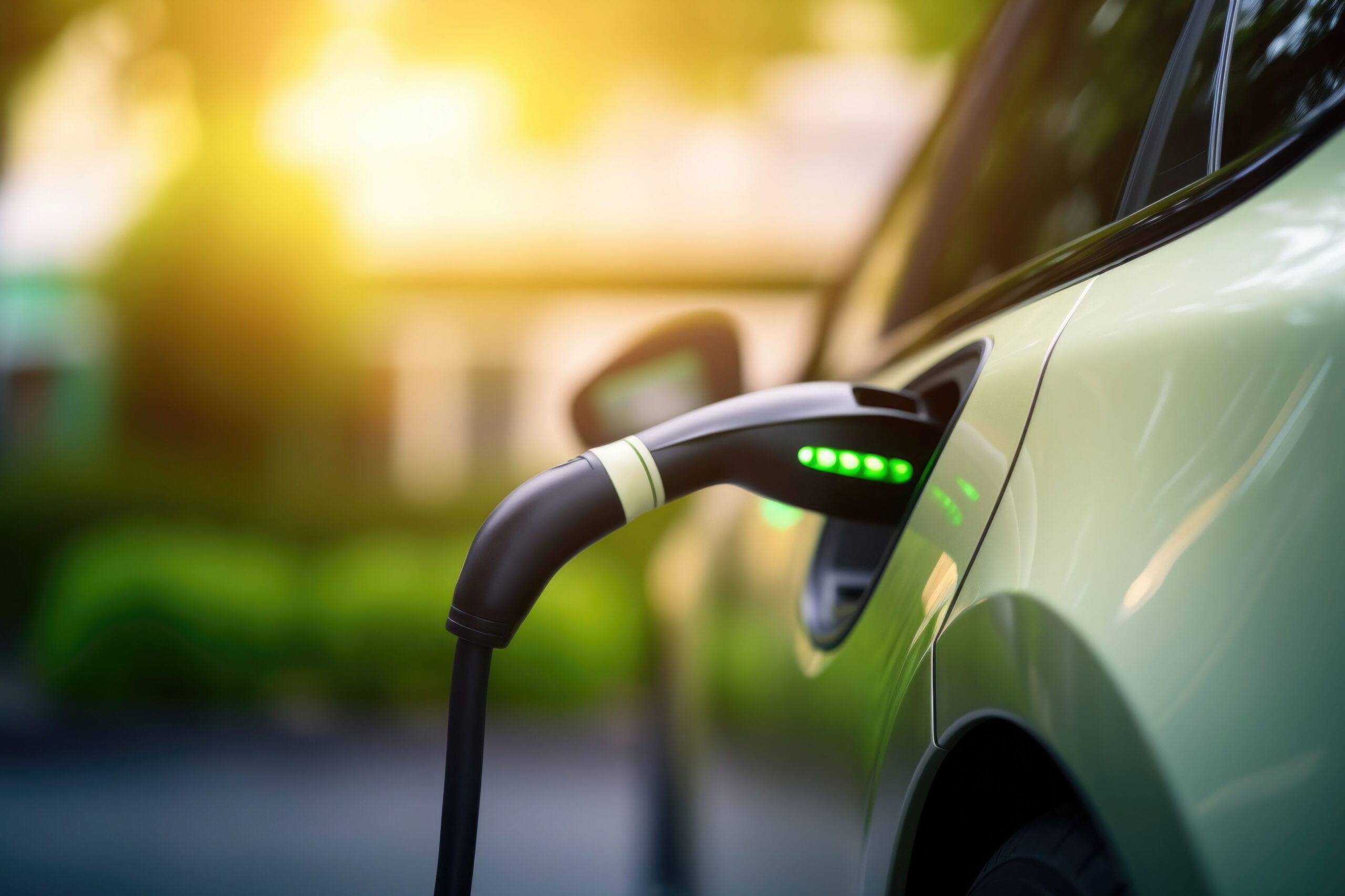EV disputes brought by consumers to The Motor Ombudsman in Q3 2025
Overview of EV disputes brought to The Motor Ombudsman relative to UK new car registrations and the overall automotive parc
Before presenting the profile and volume of electric vehicle (EV) disputes received by The Motor Ombudsman from consumers, it is important to understand the trend of EV disputes in relation to both EV and non-EV new car registrations (i.e. petrol, diesel and hybrid models), and the overall EV and non-EV vehicle parc.
When looking at the proportion of disputes received by The Motor Ombudsman versus new registrations on an annual basis for electric vehicles and non-electric models (i.e. petrol diesel and hybrid), as shown in Tables 1 and 2, it is possible to conclude that EVs generate far fewer complaints per vehicle than non-EV equivalents. For example, based on the latest 2024 full-year data, EVs were generating one dispute for every 195 cars, compared to one in every 41 vehicles for a petrol, diesel, or hybrid variant.
A similar picture can also be seen when comparing the volume of EV disputes to the combined car parc, with the two-year combined parc equating to one complaint in every 202 cars, extending to one in every 283 for the four-year combined parc. In contrast, for ICE and hybrid equivalent models, this rises to one dispute in every 51 cars for the two-year combined parc, and one in every 61 vehicles for the four-year combined parc, highlighting the variation between the powertrains.
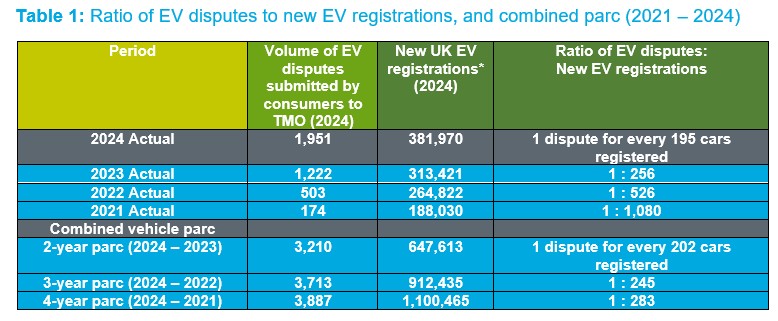
For the third quarter of 2025, the ratio of EV disputes (706) received by The Motor Ombudsman to new EV registrations (124,573) equates to one dispute for every 176 new EVs registered.
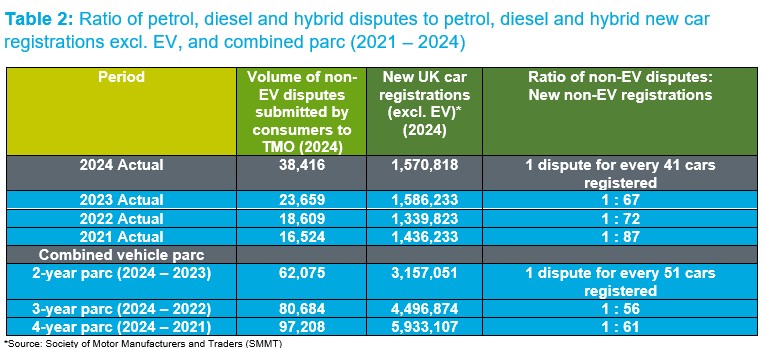
For the third quarter of 2025, the ratio of non-EV disputes received by The Motor Ombudsman (16,664) to new non-EV registrations (411,376) stands at one dispute for every 24 new non-EVs registered.
Overview of EV disputes received in Q3 2025
During the third quarter of this year, The Motor Ombudsman logged a total of 706 EV disputes – the highest quarterly tally so far for 2025, and was an equivalent increase of 38% when compared to Q3 in 2024 (511). This is a reflection of the greater number of both new and used battery electric vehicles on UK roads.
For September year-to-date, there have been 2,023 disputes logged with The Motor Ombudsman about EVs. This equates to a rise of 34% compared to the same period in 2024 (1,505), and is the first time that there have been more than 2,000 EV disputes recorded by The Motor Ombudsman within a calendar year.
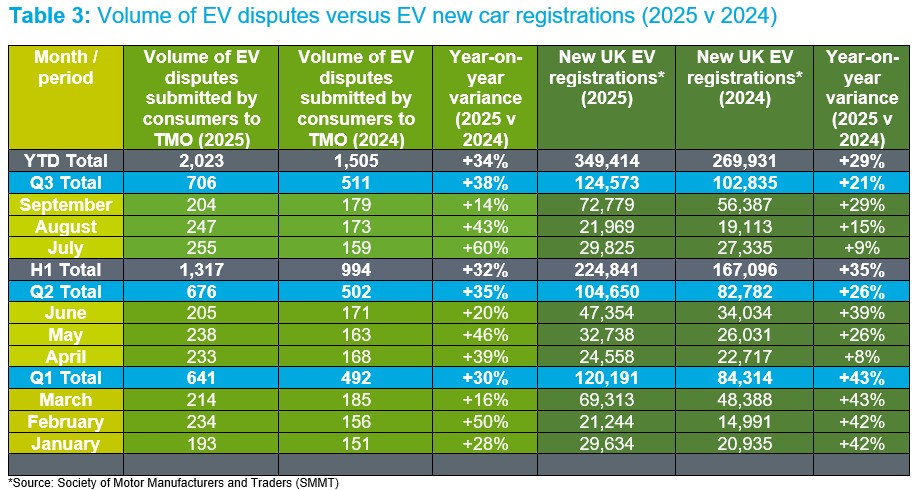
When looking at the main issues encountered by consumers with an EV during the third quarter of 2025, they are as follows:
1. Customer service and purchase issues (45%)
Maintaining the trend seen in previous quarters, customer service issues continued to be the primary driver of EV complaints during the past three months, making up nearly half (45%) of those logged with The Motor Ombudsman. Examples of concerns reported by consumers, included test driving unsafe vehicles, cars being sold with undeclared scrapes and previous owners, and problems with repairs – namely delays to the supply of parts, and damage to vehicles whilst in the care of workshops.
2. Chassis and motor issues (14%)
Problems in relation to the chassis, motor and transmission areas of an EV were reported as the second most prominent source of complaints. As well as failures of these vital components, owners highlighted faults with front shock absorbers, regenerative braking and rear wheel bearings in their case submissions. Other issues raised encompassed the likes of tyres being fitted incorrectly.
3. Electrical and software issues (10%)
Electrical and software issues made up a tenth of the complaints about EVs that were brought to The Motor Ombudsman’s attention between July and September. These stemmed from concerns, such as apps not activating in-car functions remotely, electrical faults immobilising vehicles, a loss of internet connectivity, and damage to wiring structures caused by rodents.
4. Battery issues (9%)
Batteries are a critical element of an EV, meaning faults can inhibit vehicle functionality. Cell failures, traction battery short circuits and high voltage battery faults, as well as 12V batteries draining repeatedly, all generated customer concern during Q3.
5. Interior and cabin systems issues issues (9%)
With the same proportion of complaints to batteries (9%), the interior of an EV also saw cause for complaints by vehicle owners. Water leaks resulting in cabin damage, malfunctioning climate control systems, infotainment screens going blank, speed limit recognition system failures, and roof blinds not closing properly, were sources of owner dissatisfaction.
6. Charging issues (6%)
In the event that charging errors occur, this can be a source of great inconvenience for owners. Problems reported by drivers in the past three months, comprised onboard charging units stopping working, high-power DC charging faults, and cables supplied with vehicles that were of the incorrect specification for home chargers.
7. Exterior issues (5%)
The exterior of an EV fared better than the cabin when looking at the number of disputes generated in the third quarter of this year. When it came to the bodywork, consumers reported issues with paintwork, namely protection products not being applied correctly, the presence of corrosion on wheel arches, lacquer failures on alloy wheels, as well as misaligned number plates and faulty door handles.
8. Range issues (2%)
Although it made up the smallest number of complaints in Q3 for battery electric vehicles, the actual range recorded for a full charge not matching the advertised figure, which can be driven by a multitude of factors, was the primary reason for drivers raising a dispute with The Motor Ombudsman for this element of EV ownership.
Average consumer claim value
For consumers who stated a monetary value to resolve their complaint with a business, the average stood at £6,838 for Q3 2025, which was lower than the figure recorded for the same three-month period in 2024 (£9,474).
To view and download the infographic below as a PDF, please click here.
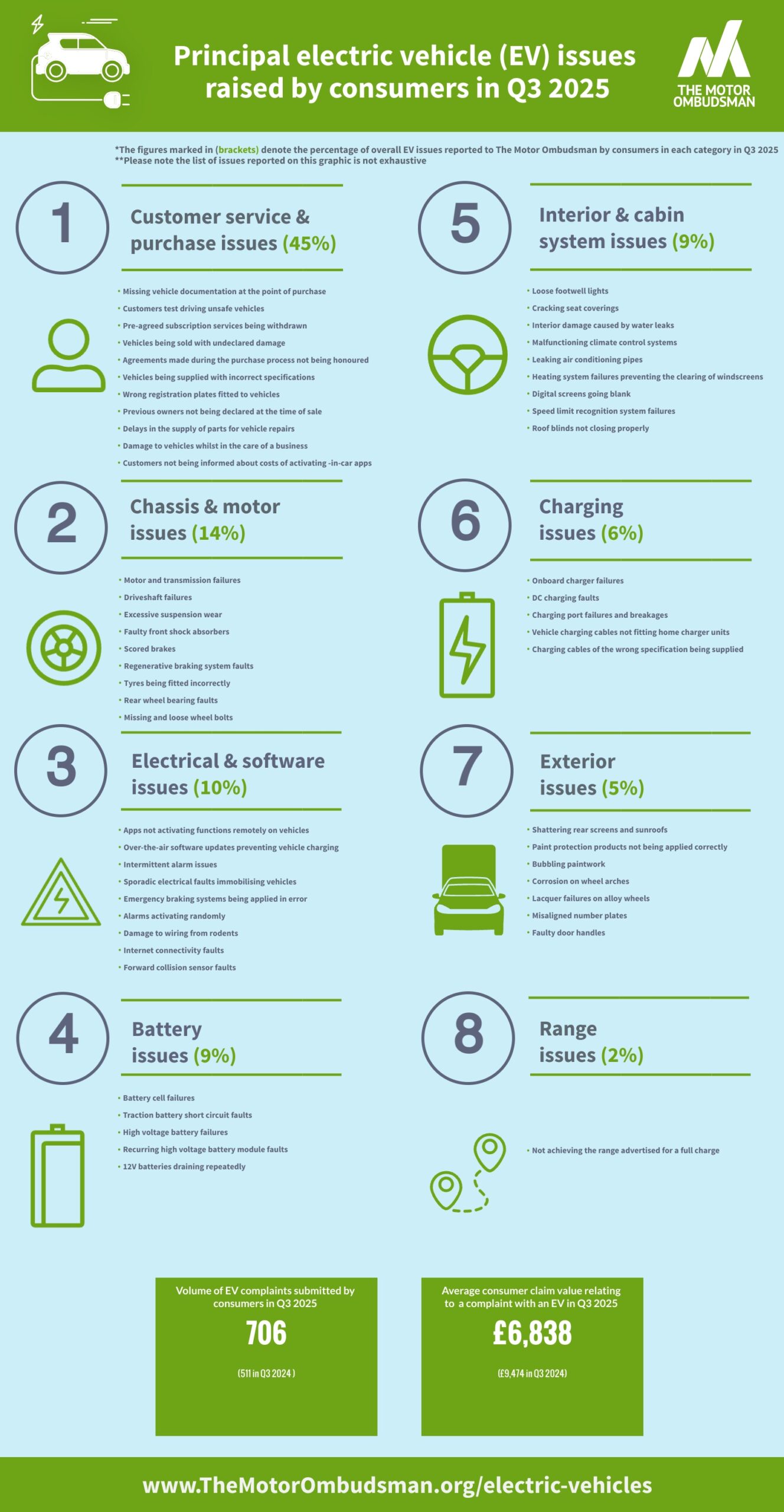
To view and download The Motor Ombudsman’s thought leadership paper on electric vehicle disputes as a PDF, please click here.
